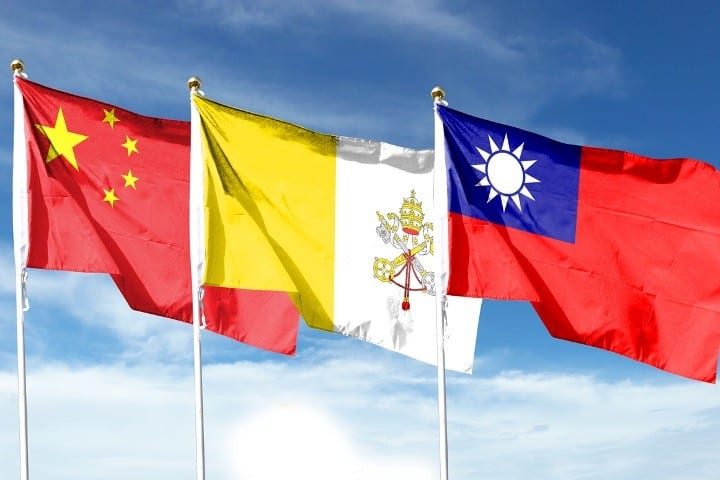
SINGAPORE — Taiwan President Tsai Ing-wen has written to Pope Francis to announce that war between Taiwan and China is not an option, and only by respecting the Taiwanese people’s desire for sovereignty and freedom can cross-Strait ties be normalized.
The Vatican is Taiwan’s only European diplomatic ally, and Pope Francis’ attempts to enhance ties with China have stoked worries in Taiwan. The democratically governed island has formal ties with only 14 countries, mostly owing to Chinese pressure.
In the letter, sent in response to the pope’s World Day of Peace message on Jan. 1, Tsai said that the war in Ukraine has made the world treasure the importance of peace, and added that ensuring regional security has become a vital focus.
“In my National Day speech last year, I reiterated that peace and stability in the Taiwan Strait are the foundation for the development of cross-Strait relations and armed confrontation is absolutely not an option,” Tsai said, based on a copy of the letter unveiled by her office.
“Only by respecting the commitment of the Taiwanese people to our sovereignty, democracy, and freedom can there be a foundation for resuming constructive interaction across the Taiwan Strait,” she said, alluding to the speech she gave on Oct. 10 last year.
Last August, the communist regime in Beijing conducted war games near Taiwan, and Beijing has frequently asserted that it would reunite with the island, by force if necessary. China claims the island nation, but Taiwan dismisses China’s sovereignty claims, indicating that only the island’s 23 million people can determine their future.
Tsai wrote that Taiwan has dispatched humanitarian aid to Ukraine, and noted that it supplied masks and protective equipment to countries during the Covid-19 outbreak, as it “hopes to give the world a better Taiwan.” “Though we are still excluded from the World Health Organisation, we are convinced that taking the lead in making positive contributions will drive a ‘virtuous circle,’” she stated. Taiwan has lamented regularly that its exclusion from the WHO owing to Chinese pressure has obstructed efforts to combat Covid-19. Both the WHO and China have dismissed that.
Last year, on a trip that the Taipei government displayed as proof of close Vatican-Taiwan ties, Tsai ‘s special envoy, former Taiwan Vice President Chen Chien-jen, met Pope Francis and asked him to “pray for Taiwan.”
Chen, a devout Catholic visiting the Vatican to attend the beatification of former Pope John Paul I, posted on his Facebook page that he was “specially received” by Pope Francis prior to the ceremony. “I conveyed President Tsai’s greetings to the Pope and asked the Pope to pray for the people of Taiwan. The Pope responded with a smile and (said he) looked forward to praying for world peace together.” Taiwan’s presidential office declared that the nine-day visit reflects the close relations between the two.
Chen went to the Vatican three times while in office, in 2016, 2018, and 2019, including the canonization ceremony of Mother Teresa.
Pope Francis told Reuters that although the Vatican’s clandestine and disputed deal with China — which offers the Holy See a say over the appointment of Roman Catholic bishops — is not ideal, he hoped it could be renewed. The deal, which was inked in 2018 and comes up for renewal every two years, is an effort to bridge a longstanding dichotomy across mainland China between an underground flock loyal to the pope and a state-sanctioned official church.
Both the Vatican and communist China have called the deal “provisional,” with sources admitting that some major issues have not been addressed yet.
Chen highlighted the temporary nature of the agreement between the Vatican and China, stating it did not involve a “diplomatic element” or change the friendship between Taiwan and the Vatican. “We urge everyone not to excessively interpret and worry about this (deal),” he said.
On social media, Tsai thanked the Pope for his blessings. “We will take active and concrete actions to support the Pope and to transmit our common values of freedom, justice, peace and care to all corners of the world,” she wrote.
While the Vatican has maintained that its deal with China is not political, some Taiwan officials fear it could be a precursor to forming diplomatic ties with Beijing, and Taiwan’s Vatican envoy has hinted that China hopes to relegate Taipei to the sidelines. Taipei has regularly blamed China for using dollar diplomacy and bullying to divert its allies away, allegations that Beijing has dismissed.
For example, Taiwan’s former allies El Salvador, Burkina Faso, and the Dominican Republic switched relations to Beijing from Taipei, leaving the island with just 14 formal allies, primarily less-developed nations in Central America and the Pacific.
The Vatican announced in 2018 that Beijing would, for the first time, permit Chinese bishops to be involved in a major Vatican meeting known as a synod. However, Bishop Michael Yeung, the bishop of Hong Kong, toldReuters it will require time to address issues apart from the appointment of bishops, and he worried that the repression of Catholics in mainland China would persist in spite of the accord.
About a dozen bishops and priests, some elderly, remain detained in China. The whereabouts of some have been unknown for decades, with Beijing remaining largely mum about their situation.



